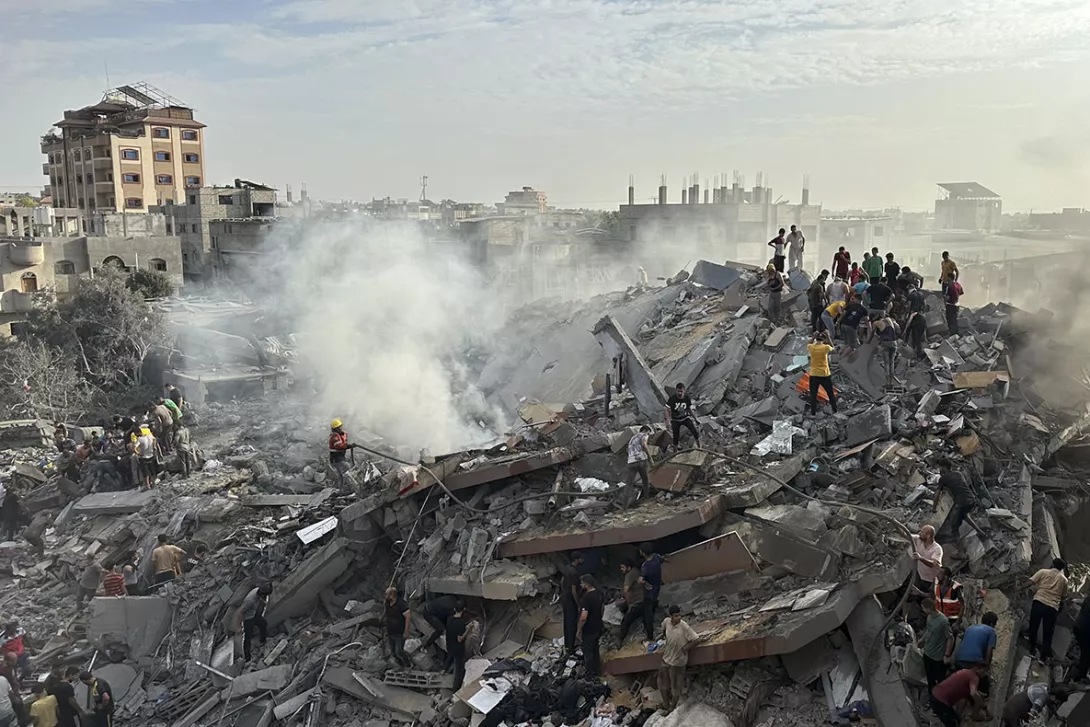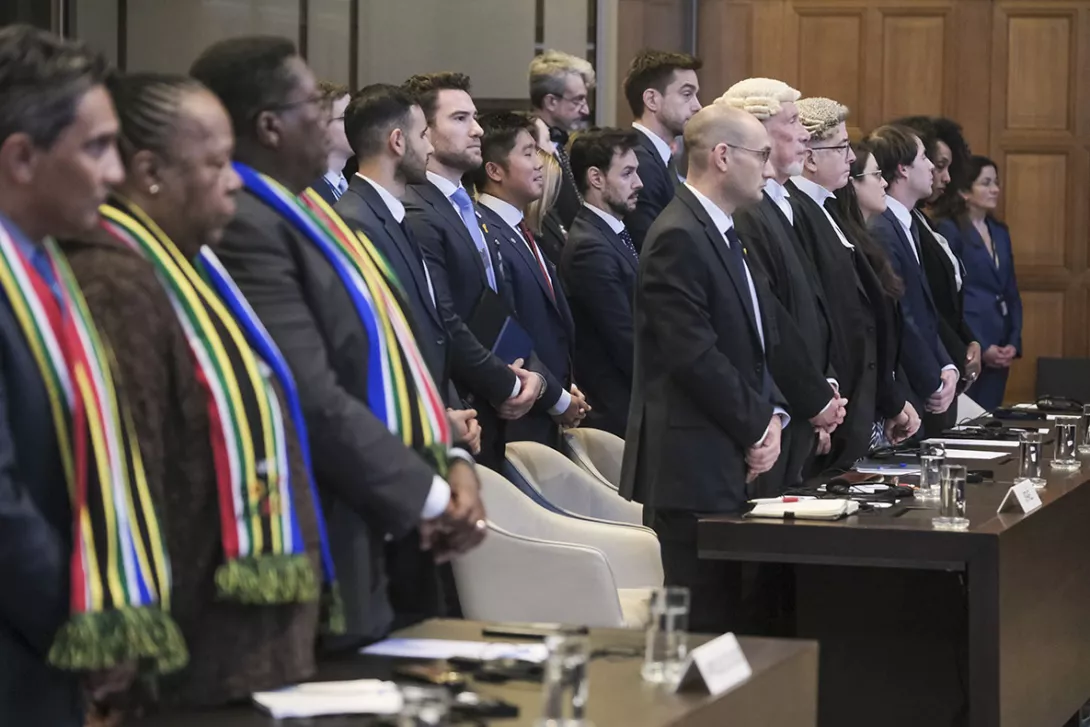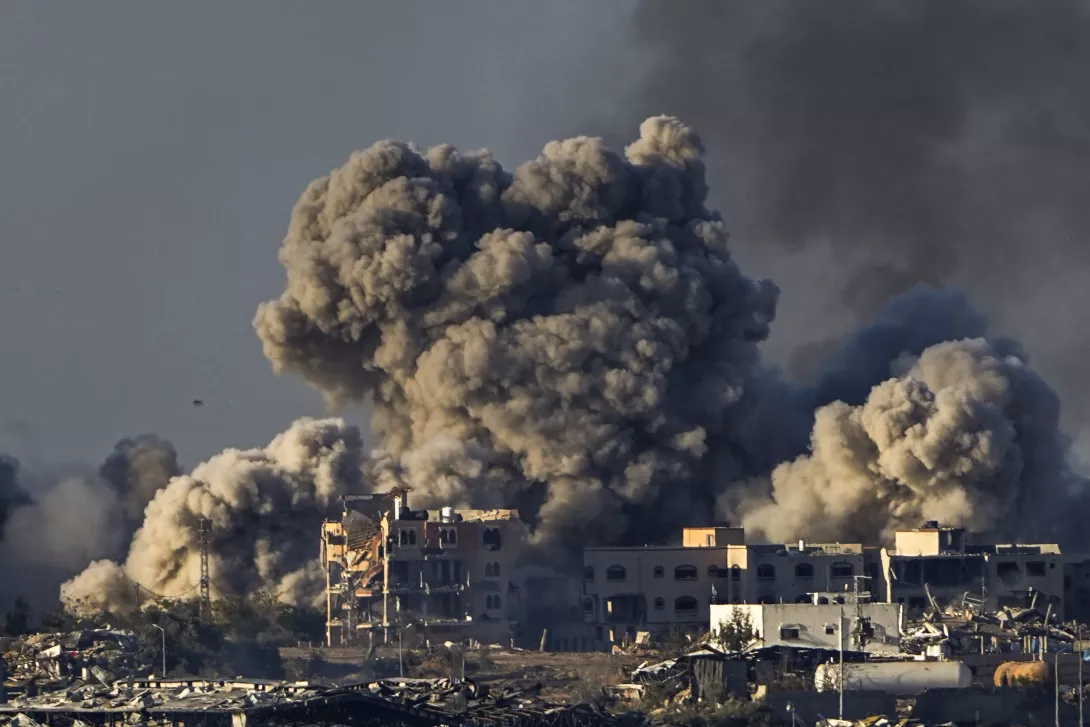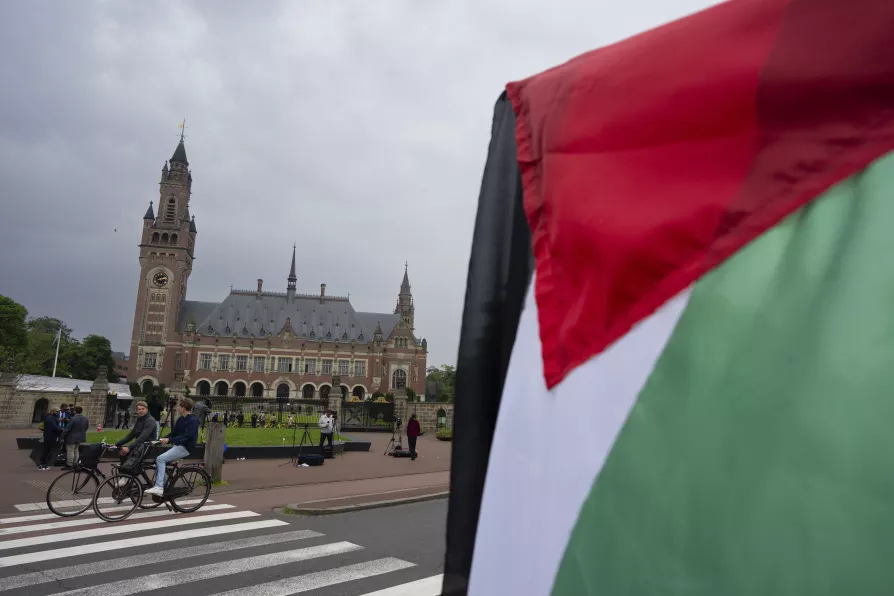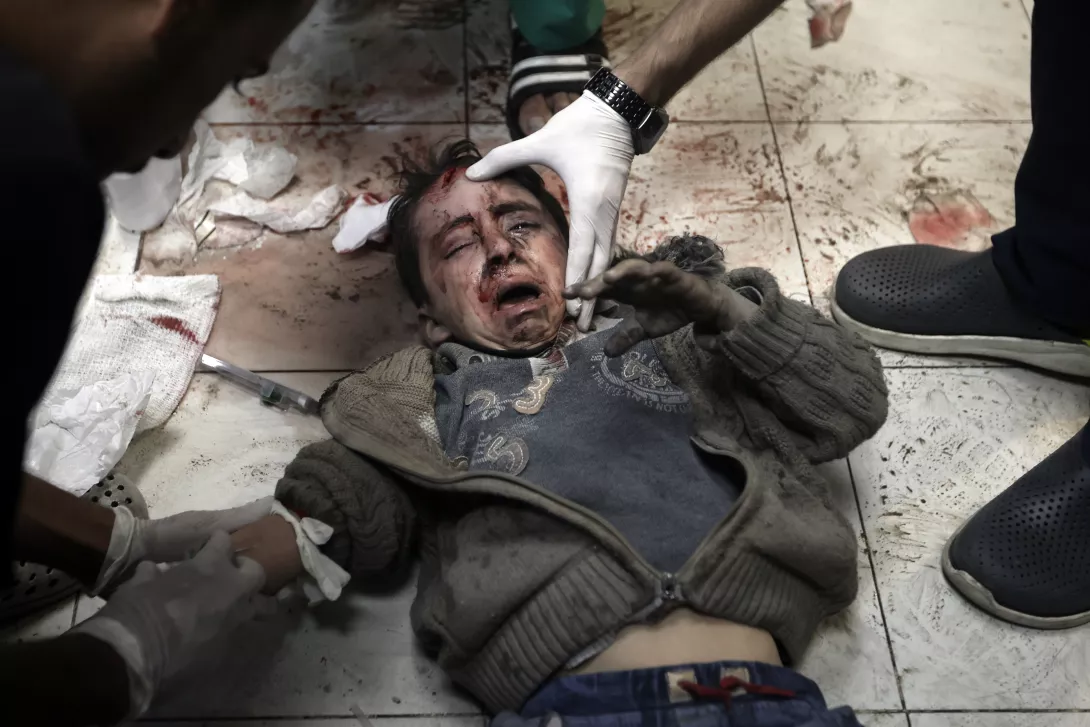
SOUTH AFRICA has launched a case against Israel at the International Court of Justice (ICJ) for crimes of genocide against Palestinian people in Gaza. The application was filed on December 29, the 84th day of Israel’s bombardment of the besieged Gaza Strip.
“The acts and omissions by Israel… are genocidal in character because they are intended to bring about the destruction of a substantial part of the Palestinian national, racial, and ethnic group,” the 84-page-long application states.
“The acts in question include killing Palestinians in Gaza, causing them serious bodily harm and mental harm, and inflicting on them conditions of life calculated to bring about their physical destruction.”
These conditions, as outlined in the document, include expulsions from homes and mass displacement along with mass destruction of homes and residential areas; the deprivation of adequate food, water, medical care, shelter, hygiene and sanitation; “the destruction of the life of Palestinian people in Gaza”; and the imposition of measures “intended to prevent Palestinian births.”
Over 21,500 Palestinians have been killed in Gaza since Israel began its attacks on October 7. An additional 7,780 people are reported missing and are presumed to be dead, buried under the rubble. Over 1.9 million people, or 85 per cent of Gaza’s population, have been displaced from their homes.
“The level of mortality in Palestinian families is such that medics in Gaza have had to coin a new acronym: WCNSF, meaning ‘wounded child, no surviving family.” For Palestinian children, in particular, “[d]eath is everywhere” and “nowhere is safe,” the application notes.
The ICJ is the chief judicial institution of the UN, which adjudicates disputes between countries. It is based at The Hague along with the International Criminal Court (ICC), a separate entity that oversees cases against individuals.
In November, South Africa, Bangladesh, Bolivia, Comoros and Djibouti had referred the “situation in the State of Palestine” to the ICC, calling on chief prosecutor Karim Khan to investigate the commission of war crimes, crimes against humanity, and genocide. While Israel is not a state party to the Rome Statute that established the ICC, it is under the mandate of the ICJ as a member of the UN.
Both Israel and South Africa are also party to the Genocide Convention, article 9 of which states that disputes between parties must be submitted to the ICJ.
Experts had begun to sound the alarm of a “textbook” case of genocide unfolding in Gaza mere days into the launch of Israel’s attacks in October.
Establishing intent
Under the 1948 Convention on the Prevention and Punishment of the Crime of Genocide, genocide is defined as acts committed with intent “to destroy, in whole or in part, a national, ethnical, racial or religious group.”
This intent constitutes the “mental element,” which “when combined with the level of killing, maiming, displacement and destruction on the ground, together with the siege — evidence an unfolding and continuing genocide” in Gaza.
The statements of intent are laid out throughout nearly seven pages in the application — including Israeli Prime Minister Benjamin Netanyahu’s repeated use of dehumanising references to Palestinians as “bloodthirsty monsters” and “children of darkness.” Also documented are statements by President Isaac Herzog, who stated: “It’s an entire nation out there that is responsible… and we will fight until we break their backbone.”
Defence Minister Yoav Gallant had announced the “complete siege of Gaza” on October 9, adding that Israel was fighting “human animals.” Other senior government officials, including Minister for Agriculture Avi Dichter had announced that Israel was “rolling out the Gaza Nakba.”
The application similarly details statements made by officials in the Israeli army, spokespersons and advisers, including statements that likened Hamas to Isis.
Giora Eland, the former head of Israel’s National Security Council and adviser to the defence minister, wrote in a journal that the people of Gaza “should be told that they have two choices; to stay and to starve, or to leave” and for Israel to create a “severe humanitarian crisis in Gaza,” making it a “place where no human being can exist.”
Gilad Kinana, the head of the Israeli army’s Air Operations Group, had stated on October 28 that the “goal is clear — to destroy everything that has been touched by the hand of Hamas.”
The application further documents seven instances of UN experts warning of the “grave risk of genocide” of the Palestinian people since mid-October, including “evidence of increasing genocidal incitement, overt intent to “destroy the Palestinian people,” loud calls for a “second Nakba” in Gaza and the rest of the occupied Palestinian territory, and the use of powerful weaponry with inherently indiscriminate impacts, resulting in a colossal death toll and destruction of life-sustaining infrastructure.”
Destroying the conditions of life
The razing of civilian infrastructure has obstructed “any realistic prospects for displaced Gazans to return home, repeating a long history of mass forced displacement of Palestinians by Israel,” a UN expert warned recently. “The forced displacements in Gaza are genocidal, in that they are taking place in circumstances calculated to bring about the physical destruction of Palestinians in Gaza,” South Africa’s application to the ICJ states.
It notes the failure of the UN security council Resolution 2720 — passed after repeated delays by the US and ultimately excluded the call for a ceasefire, a move which a former UN official called a “green light for continued genocide” — to address the situation in Gaza.
According to the UN Relief Works Agency, approximately 40 per cent of Gaza’s population is at risk of famine. Gaza’s food infrastructure had already been declared “no longer functional” by the UN World Food Programme on November 16. The IPC Integrated Food Security Phase Classification analysis released on December 21 noted that 90 per cent of Gaza’s population was facing high levels of acute food insecurity.
The projections of hunger levels until February 2024 are the highest the IPC has ever classified.
“Israel through its relentless attacks on the Palestinian healthcare system in Gaza is deliberately inflicting on Palestinians in Gaza conditions of life calculated to bring about their destruction,” the application further states.
“The Israeli army has continued to attack and besiege hospitals and healthcare centres; to deprive them of electricity and fuel crucial to maintain effective functioning and equipment; to obstruct them from receiving medical supplies, food and water; to force their evacuations and closure; and effectively to destroy them… Israel has transformed Palestinian hospitals in Gaza from places of healing into death zone[s], and scenes of “bloodbath,” “death, devastation and despair.”
The application notes over 238 attacks on healthcare in Gaza. Only 13 out of 36 hospitals and 18 out of 72 healthcare centres are functioning, “some of them barely.” 311 health workers have been killed, 22 of whom were on duty at the time. At least 570 Palestinians have been killed at hospitals and healthcare centres. Shortages of critical staff and supplies have not only led to the “otherwise unnecessary amputations of limbs,” but amputations of limbs without anaesthesia.
Pregnant women as well as children are at acute risk, with women being forced to undergo cesarean sections without anesthesia or giving birth in unsafe conditions. Premature births have reportedly increased by 25 10 30 per cent.
“Experts are beginning to warn that the numbers of Palestinians dying as a result of disease and hunger, could already be outstripping violent deaths caused by Israeli army assaults,” with over 360,000 documented cases of communicable diseases reported in UNRWA shelters so far.
Importantly, the submission to the ICJ stated that the Israeli army is “destroying the very fabric and basis of Palestinian life in Gaza.”
In addition to the destruction of homes, health and water infrastructure, mills and bakeries, Israel has targeted Gaza’s Palace of Justice which houses the supreme court, Gaza City’s Central Archive building which holds historical documents dating back a century, destroyed the enclave’s public library, and attacked each of Gaza’s four universities.
An estimated 318 Muslim and Christian religious sites have been destroyed, as have historical sites, along with learning and cultural centres and museums.
“Along with its destruction of the physical monuments to the history and heritage of the Palestinians in Gaza, Israel has sought to destroy the very Palestinian people who form and create that heritage,” the application says, speaking of the farmers, teachers, journalists, intellectuals, health workers, film-makers and artists who were among those killed.
Citing these violations, South Africa has contended that Israel has violated its obligations under the Geneva Convention, including the failure to prevent and punish genocide, committing genocide, and direct and public incitement to genocide. It has called upon the ICJ to declare that Israel has breached said obligations and that it must cease any acts or measures that violate these obligations.
It has urged the court to urgently indicate provisional (temporary or interdict) measures to “protect against further, severe, and irreparable harm” to the rights of the Palestinian people under the Genocide Convention, especially given that Israel has “continued, escalated and threatened further to escalate its military campaign.”
The provisional measures sought include Israel immediately suspending its military aggression in and against Gaza, to “desist” from committing all acts defined as genocide under Article II of the Genocide Convention and detailed in the application.
The document notes, importantly, that to indicate provisional measures, the Court is not required to determine whether Israel has violated the Genocide Convention. Instead, what it needs to establish to take interim action is “whether the acts complained of… are capable of falling within the provisions” of the convention.
This article appeared on Peoplesdispatch.org.
